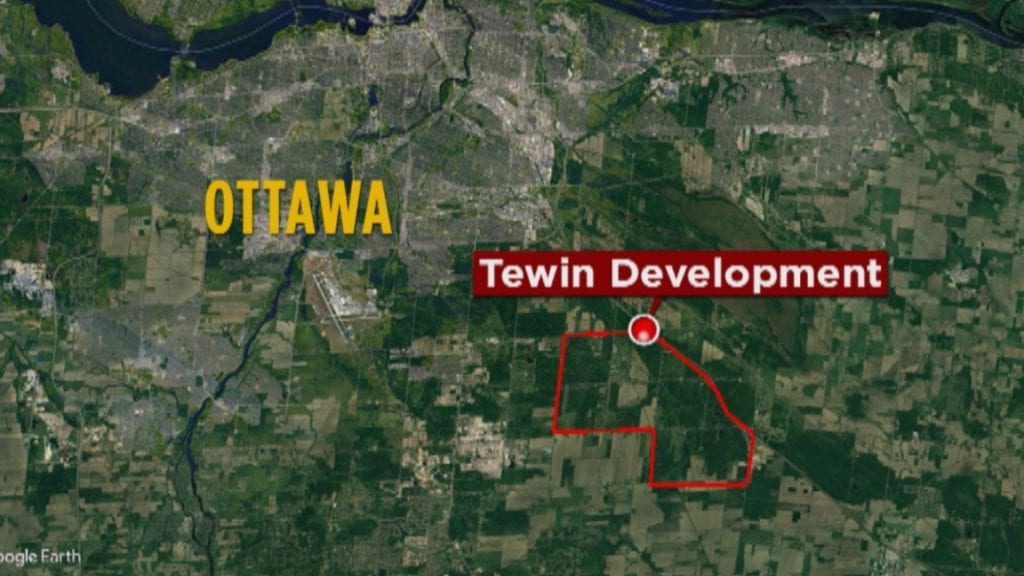
Despite objections by Algonquin chiefs in Quebec, the City of Ottawa has approved construction of a new suburb under the flag of reconciliation.
The development is for a new community, built from scratch, in the south east limits of Ottawa.
The mega-project was proposed by the Algonquins of Ontario (AOO) who have partnered with Taggart Investments and the new suburb could house up to 45,000 residents.
The AOO are a group of status and non-status Algonquins and they are calling their new community Tewin, meaning ‘home’.
The city maintains the ambitious project was approved because of reconciliation but there were objections from councillors.
Coun. Shawn Menard motioned to have the decision delayed a year for consultation because, “The Tewin lands were inappropriately framed as an act of reconciliation without proper consultation.”
His motions said staff were not provided the opportunity to conduct a thorough and fulsome review of the impact of adding the Tewin lands to the urban boundary.
His recommendations, among other things, were to develop a consultation approach with Indigenous communities in line with the city’s reconciliation framework.
After lengthy discussions the Tewin project was approved by a vote of 16 to 8.
Algonquin First Nations Chiefs are furious the City of Ottawa didn’t consult them before making the deal.
“We don’t see this as a reconciliation deal,” said Verna Polson Grand Chief of the Algonquin Anishinabeg Nation Tribal council. “Maybe some of us are not aware of the terms of reconciliation because it seems like it’s used for anything and for anyone.”
The Tribal council has seven of the 11 Algonquin First Nations as members including the Wahgoshig First Nation in Ontario and six located in Quebec.
The three remaining Algonquin First Nations in Quebec form the Algonquin Nation Secretariat and the lone First Nation aligned with the AOO is the Algonquins of Pikwakanagan First Nation located on the Ontario side about 140 km west of Ottawa.
It’s difficult to pinpoint where the divides between Algonquin Nations stem but they culminated in 2016 when the governments of Canada and Ontario embarked on a massive land claim agreement with the AOO.
The deal is in the works and worth $300 Million and over 47,000 hectares of Crown land.
At the time and to this day Algonquin First Nations in Quebec are opposed to the deal and question the ancestry of AOO members.
Wendy Jacko, chief of Pikwakanagan First Nation and lead negotiator for the AOO gave APTN this statement earlier in the week.
“Rather than undermining our self-determination and perpetuating colonial divisions, the Algonquins of Pikwakanagan First Nation have taken an inclusive, nation-building and reconciliatory approach to our present and future.”
In respect to ancestry, Jacko said.
“It is not possible to be enrolled by the AOO with only distant heritage as it has been suggested. Many of those individuals enrolled by the AOO are connected to current Pikwakanagan families – many even possess Indian Status under the Indian Act.
“We do owe it to our ancestors to rise above this divisive non-status nonsense and focus on decolonization and reconciliation with willing and able partners in the City of Ottawa and beyond.”
This new deal with Ottawa is just the latest thorn in the sides of Algonquin First Nations chiefs.
Polson said she and other chiefs would like to sit down with the city and discuss how they can be a part of the project going forward or at least be consulted from now on.
She and the other Tribal Council chiefs are looking forward to working with the city on this and other matters going forward.
Polson said they reached out to meet with the Mayor Jim Watson but still have not gotten a response.
The council will approve the AOO’s final plan later this year.









